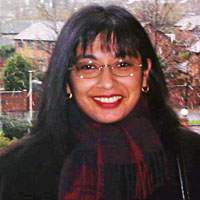Biography
I was appointed as a Lecturer at the School of Life Sciences at Keele University in October 2007. I graduated with a BSc Honours from the University of Salford before embarking on a research career driven by my interest in the role of the vascular endothelium in pathology.
My career started as Research Assistant at University of Wales College of Medicine at Cardiff before I joined Professor Savage’s group at the University of Birmingham. Here, I completed a PhD in Medicine, studying the mechanisms of leukocyte recruitment and retention in renal inflammation. I continued in Professor Savage’s group as a post-doctoral scientist investigating the role of chemokines and adhesion molecules in renal inflammation. I went on to investigate mechanisms of neutrophil transmigration through endothelial cell monolayers under laminar flow in Professor Gerard Nash’s group, also at the University of Birmingham.
In 2002, I turned my focus on the role of the endothelium in Malaria pathogenesis and joined Professor Alister Craig’s group at the Liverpool School of Tropical Medicine. Here, I investigated mechanisms of malarial cytoadhesion to the endothelium in vitro, under static and also under laminar flow conditions, leading to a number of successful collaborations.
I completed a Teaching and Learning in Higher Education Postgraduate at Keele University in September 2010 and have achieved recognition as a Fellow of the Higher Education Academy. I was appointed Programme Director for Human Biology Programme from the start of the programme in 2009 till 2018. I was appointed External Examiner for the Human Biology Programme at University of Derby from July 2014 till October 2018. I was appointed as a Reviewer on the Faculty of Natural Science (non-Psychology) Research Ethics Committee from September 2022 tilll January 2024.
I have supervised four PhD students between 2011 and 2021, who have all completed successfully.
I retired in January 2024, and currently hold honorary status.
Research and scholarship
Broadly my research interests include on the post-adhesive, phenotypic, functional and transcriptional changes in endothelial cells, induced by Plasmodium falciparum-infected red blood cells, in severe malaria. My research laboratory is established within the Faculty of Natural Sciences in the Centre for Applied Entomology and Parasitology.
My research focuses on cerebral malaria, with a view to understanding the mechanisms underlying the disruption of the blood-brain barrier (BBB) integrity and its impact on other cells of the brain parenchyma, such as astrocytes, during sequestration. The studies in my laboratory involved in vitro co-culture models that mimic sequestration of Plasmodium falciparum-infected red blood cells on the microvascular endothelium of cerebral vessels. Research investigations using human brain microvascular endothelial cells and human astrocytes in a tandem model system, in vitro, include, 1) functional assays to measure barrier electrical resistance and permeability changes to monitor alterations in the BBB and 2) immunoassays including ELISA, western blotting, immunofluorescence and flow cytometry, to monitor molecular changes in endothelial cells and astrocytes of the BBB.
Previous studies involved microarray analysis of the endothelial cell transcriptome and resulted in a successful collaboration with the Wellcome Trust Sanger Institute, as part of the Wellcome Trust Functional Genomics Initiative in Malaria at Liverpool School of Tropical medicine.
My research at Keele University has been supported by awards from the North Staffordshire Medical Institute, The Wingate Foundation, Society for the Study of Human Biology; and Institute for Science and Technology in Medicine and the Faculty of Natural Sciences, at Keele University.
PhD students:
Principal supervisor to: Atieme Joseph Ogbolosingha from Nigeria (co-supervisor: Prof. Rosemary Fricker). Completed November 2021. Funded by Petroleum Technology Development Fund, Nigeria.
Principal supervisor to: Linda Anagu from Nigeria (co-supervisor: Dr Catherine Merrick). Completed November 2019. Funded by the Tertiary Education Trust Fund (TETfund) Nigeria.
Principal supervisor to: Nana Efua Andoh from Ghana (co-supervisor: Prof. Rosemary Fricker). Completed December 2018. Self- Funded.
Principal supervisor to: Mohd Hamzah Mohd Nasir from Malaysia (co-supervisor: Prof. Gwyn Williams). Completed March 2015. Funded by Kementerian Pengajian Tinggi Malaysia.
Publications
School of Life Sciences,
Huxley Building,
Keele University,
Staffordshire,
ST5 5BG
Tel: +44 (0) 1782 734414
Enquiries:
Tel: +44 (0) 1782 734414
Email: lifesciences.office@keele.ac.uk


